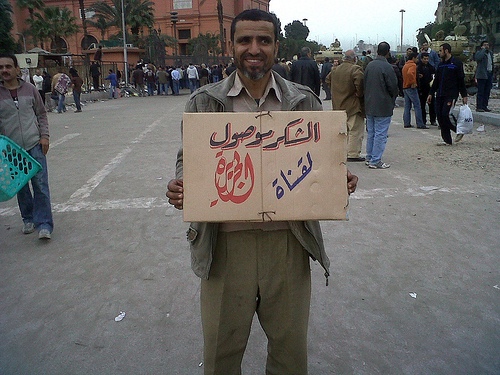hillary clinton

First, let’s be clear that this was the Egyptian Revolution, not the “Facebook Revolution” or the “Twitter Revolution.” Events of the past few weeks belong wholly to spirit of the Egyptian people, not technology. And although it was built on democratic aspirations, this was not a revolution that drew any inspiration from the United States.
This is one of those rare, defining moments in world history. In Egypt - as well as Tunisia, Sudan, Yemen and elsewhere - change is unfolding at almost blinding speed. The reactions of the USA, EU, and UN so far have succeeded mainly in positioning the international community well behind the curve, scrambling to catch up. Developments on the ground continue to outpace responses by a wide margin.
Secretary of State Hillary Clinton and Senate Foreign Relations Committee chairman John Kerry (D-MA) both said independently today that the Egyptian government should cease the use of violence against protesters but only Kerry called for free and fair elections this year.
As Secretary Hillary Clinton stated last week, U.S.-China relations are now at “a critical juncture.” Public diplomacy plays a crucial role in steering this vital relationship in a positive direction.
Women can be a major power in convincing Mideast leaders to agree to a comprehensive Arab-Israeli peace deal, U.S. Secretary of State Hillary Rodham Clinton said Wednesday as she urged regional leaders to embrace the rising expectations of their skyrocketing youth populations.
The digital revolution is finally starting to penetrate that most traditional of organizations: the foreign ministry. Not surprisingly, given the pace of change in the digital world as a whole, the conduct of diplomacy is set to undergo a major evolution as these technologies shake up the status quo.
On Dec. 15, Secretary of State Hillary Clinton rolled out the State Department's first ever Quadrennial Diplomacy and Development Review (QDDR) at an internal town hall meeting -- a year behind schedule. No surprise, it turns out to be more of a public relations document than a disciplined strategic review.
The philosophy is that the military can secure an area, while civilians implement quick impact development projects meant to win the support of Afghans. Hillary Clinton calls the strategy “smart power” and praises the inter-agency coordination it has brought to U.S. involvement there.







